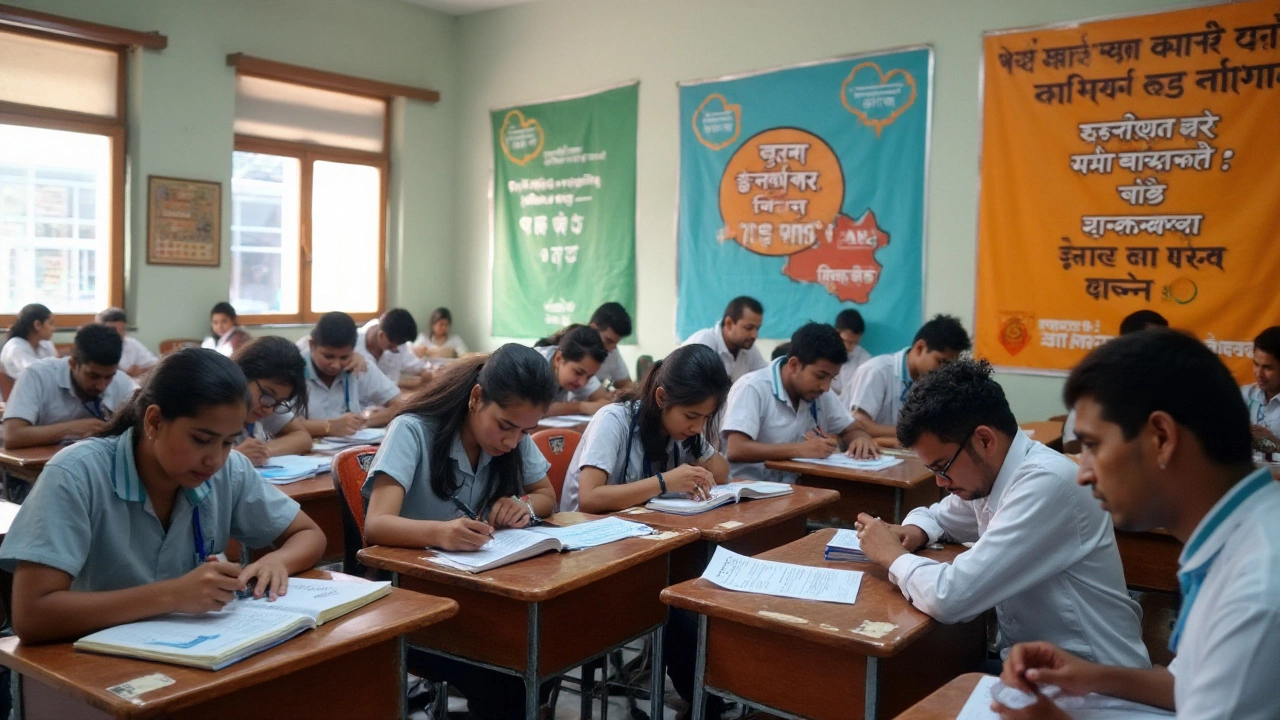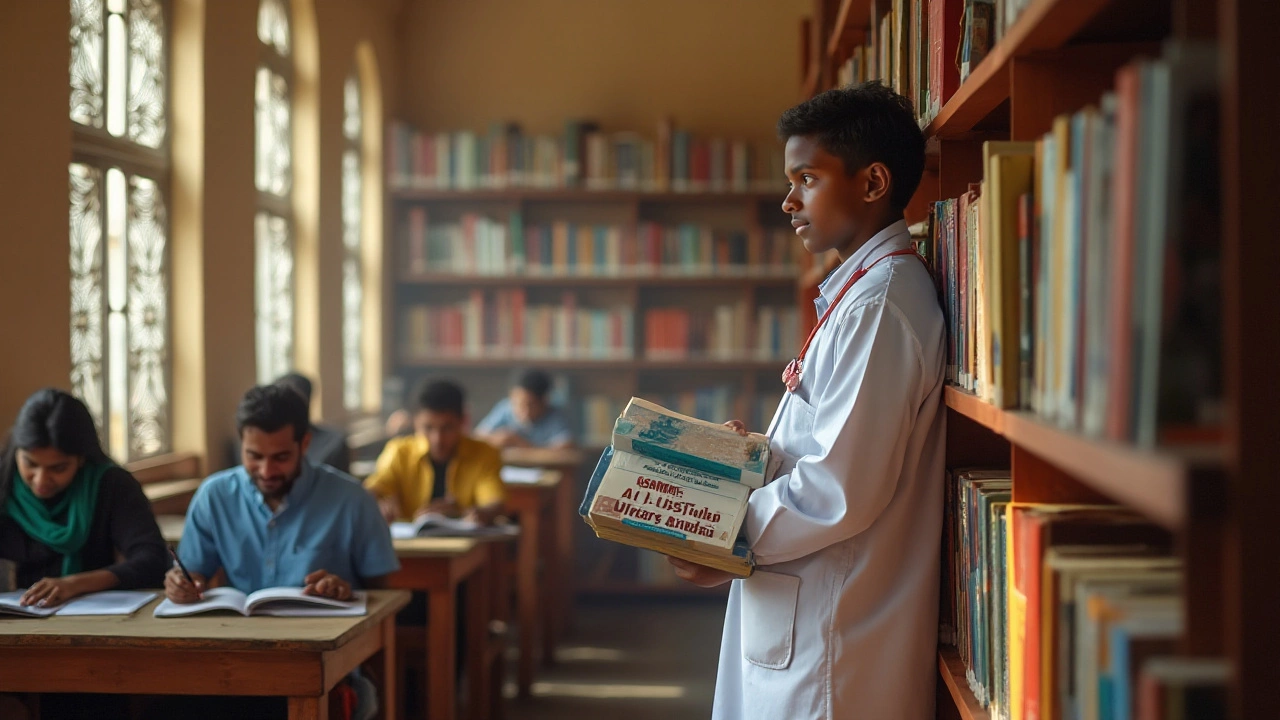
Navigating the Toughest Medical License Exams: A Guide for Future Physicians
Pursuing a career in medicine is no easy feat, primarily due to the rigorous nature of medical license exams. These exams serve as gatekeepers, ensuring candidates are thoroughly prepared to step into the medical field as competent physicians.
Aspiring doctors often face a tough road, filled with long hours of study and stress. Medical license exams like the USMLE, MRCP, and PLAB are infamous for their difficulty, requiring not just knowledge but also stamina and persistence. Each test is unique in its structure and challenges, demanding a comprehensive understanding and strategic preparation.
This exploration into the world of medical licensing exams aims to provide a roadmap for future physicians. By understanding what makes these exams tough and adopting efficient study techniques, candidates can approach their preparation with confidence and clarity.
- Understanding the Structure of Medical License Exams
- Why the USMLE Stands Out
- Comparing Other Notorious Medical Exams
- Effective Preparation Strategies
- Tips for Maintaining Mental Health During Exam Prep
Understanding the Structure of Medical License Exams
The world of medical exams is vast and varied, each designed to assess the competency of aspiring doctors in distinct ways. These exams not only test your knowledge but also scrutinize your ability to apply it in practical settings. Starting with the United States Medical Licensing Examination (USMLE), this multi-step exam is known for its grueling and comprehensive nature. Taken in three parts, the USMLE tests candidates over several aspects of medical practice. Step 1 focuses on understanding and applying basic sciences, while Step 2 (Clinical Knowledge and Clinical Skills) assesses clinical sciences through both written exams and hands-on patient interactions. Finally, Step 3 evaluates one’s ability to manage a patient in a real-world, unsupervised environment.
Across the Atlantic, the Membership of the Royal Colleges of Physicians (MRCP) in the UK presents its own significant challenges. Divided into three sections, Part 1 and Part 2 test medical knowledge and clinical experiences through written exams that demand critical thinking and in-depth understanding. The PACES (Practical Assessment of Clinical Examination Skills), akin to the USMLE Step 2 Clinical Skills, is where a candidate’s practical expertise comes under scrutiny through observed patient evaluations.
The Professional and Linguistic Assessments Board (PLAB) test is another critical exam for foreign doctors wishing to practice in the UK. PLAB is divided into two parts: a written test and an Objective Structured Clinical Examination (OSCE). The latter involves a series of stations where candidates must demonstrate their medical knowledge and communication skills in simulated scenarios. This structure aims to mirror real-life challenges that doctors may face in the UK, ensuring they are prepared for local practices and patient interactions.
According to Dr. John Carter, an esteemed reviewer in The Journal of Medical Education, "These exams are not just a test of medical knowledge but a trial of resilience and adaptability, demanding a balance of theoretical understanding and practical prowess."
Other countries have their versions, like the Australian Medical Council (AMC) exams and the Medical Council of Canada Qualifying Examination (MCCQE), each uniquely tailored to their healthcare systems. The AMC Clinical Exam, for example, requires candidates to tackle clinical problems presented in a realistic format, offering different hurdles compared to written tests. As a part of exam preparation, understanding the specific format and focus areas of these tests is crucial for success. Knowing whether to sharpen diagnostic skills or enhance patient communication techniques can help strengthen one's weak spots.
This intricate design of medical license exams is not just about sifting through academic prowess; it assesses one's readiness to make critical decisions that affect human lives. The structure aims to reflect real-life medical scenarios, testing not just what you know, but how effectively you can put that knowledge to use. With such a framework, these exams become a rite of passage for future physicians, preparing them not just to be doctors in title, but in capability and action.
Why the USMLE Stands Out
The USMLE (United States Medical Licensing Examination) is often recognized as the gold standard for medical licensing exams worldwide, and for good reasons. One of the foremost reasons it stands out is its comprehensive approach to evaluating a candidate's ability to apply knowledge, concepts, and principles crucial in health and disease care. The USMLE is divided into three distinct steps, each focusing on different aspects of medical education and practice. Step 1 tests the examinee's grasp of basic sciences concepts, Step 2 evaluates clinical knowledge and skills, and Step 3 assesses whether the examinee can apply medical knowledge and understanding of biomedical and clinical science to the practice of medicine without supervision.
The rigor of this exam is a significant aspect of its distinctiveness. Each step spans over a day or two of testing, with Step 1 including as many as 280 multiple-choice questions. It is not just the breadth of questions but also the depth, requiring not mere rote memory but the ability to apply complex concepts in situational medical problems. This setup ensures that only those with solid foundational knowledge qualify to proceed, maintaining high standards within the medical field. The necessity for precise clinical judgment is another part of what makes the USMLE exceptionally challenging. As stated by Dr. Michael Barone, vice president for licensure programs at the National Board of Medical Examiners, "Our goal is to ensure that every physician possesses the knowledge, skills, and attitudes essential for safe and effective patient care."
"Our goal is to ensure that every physician possesses the knowledge, skills, and attitudes essential for safe and effective patient care." — Dr. Michael Barone
Being a gateway to practice in the United States, it serves an essential function for international medical graduates (IMGs), who must clear this hurdle to gain residency placements. The exam's impact is profound, influencing not only individual aspirations but also shaping the global healthcare workforce as it determines who enters the US medical systems. In fact, the USMLE is a pivotal criterion used by residency programs across the country to assess candidates. The scores attained in these steps are often determinative, impacting partnership and specialization opportunities. This is why strategic preparation becomes indispensable, involving months or even years of planning and study.
Statistics reveal just how challenging the USMLE can be. According to the Federation of State Medical Boards (FSMB) and the National Board of Medical Examiners (NBME), the average passing rate for Step 1 in recent years has been around 95% for US MD students but drops significantly for foreign-trained students. This disparity highlights the added difficulty for international entrants, who need to adapt their preparation styles and understand the US healthcare context deeply. The examination requires unfamiliar familiarity for many—a deep dive into both vast medical knowledge and the particularities of the US medical environment. Therefore, the USMLE is considered a triumph for those who pass and fulfills dreams of many eager to practice medicine in one of the most developed medical frameworks globally.
Understanding this daunting challenge means knowing what to expect. The exam smashes the limits of a textbook, pulling clinicians and students into a realm where practical skills, quick thinking, and profound knowledge intertwine. With relentless focus and meticulous preparation, mastering the USMLE might unlock numerous opportunities within the healthcare industry for aspiring physicians worldwide. In essence, it stands as a monumental challenge, yet it is a vital step that ensures the excellence and safety of medical practice.

Comparing Other Notorious Medical Exams
When we dive into the world of medical licensing internationally, several exams besides the well-known USMLE prove to be notably challenging. The MRCP from the United Kingdom, the PLAB also in the UK, the AMC in Australia, and the MCCQE in Canada, all hold their reputation as rigorous medical exams that test the mettle of aspiring physicians. Let's first unpack what makes the MRCP such a formidable opponent for medical graduates. The Membership of the Royal Colleges of Physicians (MRCP) is tailored for those wishing to pursue a specialist physician role in the UK. Divided into three parts, this exam tests knowledge through multiple-choice questions and increasingly focuses on patient care as candidates progress. Understanding diseases in greater depth and developing critical decision-making skills are central to its requirements, making it not just a test of memory but of real-world medical application.
The PLAB, or Professional and Linguistic Assessments Board test, is another UK-based exam designed for international medical graduates to demonstrate their readiness to practice medicine in the UK. Compared to the MRCP, PLAB is often seen as slightly more accessible in terms of content but brings its own challenges with its heavy focus on English proficiency and ethical understanding needed for effective communication in a global setting. The PLAB is developed with a two-part structure: a written assessment and a practical objective structured clinical examination (OSCE). This hands-on aspect requires candidates to navigate clinical scenarios, emphasizing not just knowledge, but proficiency and confidence in procedural execution.
Shifting geographies to Australia, the Australian Medical Council (AMC) assessment stands as a two-stage exam comprised of a computer adaptive test and a clinical examination. The AMC instrument is meticulous, pushing candidates to adapt to Australia's specific healthcare standards and practices. Its high pass threshold ensures that only those with a comprehensive grasp of core medical standards succeed, benefiting the country's high medical standards. Meanwhile, Canada's MCCQE is unique in its integration of clinical skills evaluation with theoretical knowledge. Spanning two parts, it evaluates candidates' abilities in diagnosing, managing patient cases, and integrating knowledge across varied contexts of general medicine.
Consider this insight by Dr. John Timmins from the British Medical Journal:
'The most challenging aspect of international medical exams is not just in their content but in adapting one's preparation to the cultural and procedural nuances of each country.'While anecdotal, quotes like these highlight the real trial faced by medical graduates—stretching beyond familiar shores and immersing in a spectrum of global medical landscapes. These exams are more than mere tests of rote knowledge; they are intricate assessments of a candidate’s capacity to practice medicine with a deep understanding and adaptability to diverse healthcare settings across the globe.
Effective Preparation Strategies
Preparing for medical exams such as the USMLE or MRCP requires more than just memorizing textbooks. It involves a well-rounded approach that combines consistent study habits with practical application of knowledge. A key strategy is to create a study schedule that allocates specific time slots for each subject area, ensuring that all material is covered comprehensively. This helps in managing time effectively and reduces anxiety as the exam day approaches. To optimize learning, it is crucial to engage with varied resources like peer-reviewed articles, medical forums, and interactive online modules.
Another essential element of preparation is practicing with past exam papers and mock tests. These resources help in understanding the format and types of questions frequently asked in these challenging examinations. By doing so, candidates can identify their weak areas, allowing them to focus extra effort on those topics. It's also beneficial to study in groups occasionally, as peer discussions can often introduce new perspectives or clarify doubts. Remember to incorporate regular breaks into your study sessions to avoid burnout; this not only refreshes the mind but also increases retention.
"Success is no accident. It is hard work, perseverance, learning, studying, sacrifice, and most of all, love of what you are doing." – Pelé
The use of visual aids and mnemonics can significantly enhance recall abilities. For instance, creating mind maps or flowcharts for complex processes or diseases can make the information more digestible and memorable. Many top performers also recommend flashcards for quick revision sessions. Moreover, considering the vastness of the syllabus, separating critical information from supplementary details is invaluable and can be achieved by consulting with senior students or educators who have navigated these examinations.
A holistic approach also includes maintaining mental and physical well-being. Regular exercise, adequate sleep, and healthy eating habits play a crucial role in keeping stress at bay and boosting cognitive function. Candidates should not hesitate to seek emotional support or counseling if they find the pressure overwhelming. Nowadays, numerous apps and platforms offer guided meditation and mental health support specifically designed for students facing high-stakes exams. Keeping a work-life balance not only contributes to a healthier study routine but also fosters a positive outlook towards the demanding process.
Lastly, being adaptable in your study methods according to personal learning styles can substantially enhance efficiency. Some students find success through auditory methods, like listening to recorded lectures, while others benefit from teaching the material back to others. It's important to self-reflect periodically during the preparation phase to assess what's working and what isn't. With discipline, dedication, and diverse learning techniques, navigating these highly competitive exams becomes a more achievable goal.

Tips for Maintaining Mental Health During Exam Prep
Embarking on the journey of medical license exams brings more than just intellectual challenges. The intense pressure can have a profound impact on an aspiring physician’s mental health. Balancing rigorous study schedules with personal well-being requires a proactive approach. One important strategy is creating a structured routine that includes regular breaks. It is essential to step away from the textbooks and stethoscopes occasionally, allowing the mind time to relax and reset. Integrating short, frequent breaks into your study schedule can improve focus and efficiency.
Exercise plays a significant role in sustaining mental health during this demanding time. Engaging in physical activity, even something as simple as a brisk walk, can reduce stress and improve mood. Exercise stimulates the release of endorphins, which are chemicals in the brain that act as natural mood lifters. Consistent physical activity not only decreases anxiety levels but also enhances cognitive function, which is crucial when preparing for exams as challenging as the USMLE and MRCP.
"The mind is just like a muscle—the more you exercise it, the stronger it gets and the more it can expand," said Idowu Koyenikan, a respected author on personal development.
The importance of sleep cannot be overstated. Quality sleep is vital for memory consolidation and cognitive processing. While it may be tempting to pull all-nighters, this often leads to diminished returns. Aim for 7 to 9 hours of sleep each night. Creating a serene bedtime routine, free from screens and study notes, can help establish a healthy sleep pattern. These habits ensure you're well-rested and ready to tackle complex concepts and problem-solving tasks the following day.
Nourishing your body with healthy, balanced meals is another cornerstone of mental health. Consuming a diet rich in fruits, vegetables, lean proteins, and whole grains can fuel the brain and support concentration. Dehydration is a common, often overlooked stressor that can lead to fatigue and irritability. Keeping a water bottle on hand as you study can counteract this, helping maintain energy levels throughout the day. Including nuts, seeds, and dark chocolate in your snacks can provide the brain with essential nutrients.
Mindfulness and mediation practices also offer significant benefits. These techniques allow you to cultivate patience, focus, and presence, reducing overwhelming feelings of stress. Just 10 to 15 minutes of daily meditation can make a notable difference in your overall mental health. Choosing a designated space for meditation and practicing control over your breathing can help ease anxiety related to the pressing demands of medical exams. Consider apps or online resources to guide your practice, making mindfulness a simple addition to your routine.






Write a comment